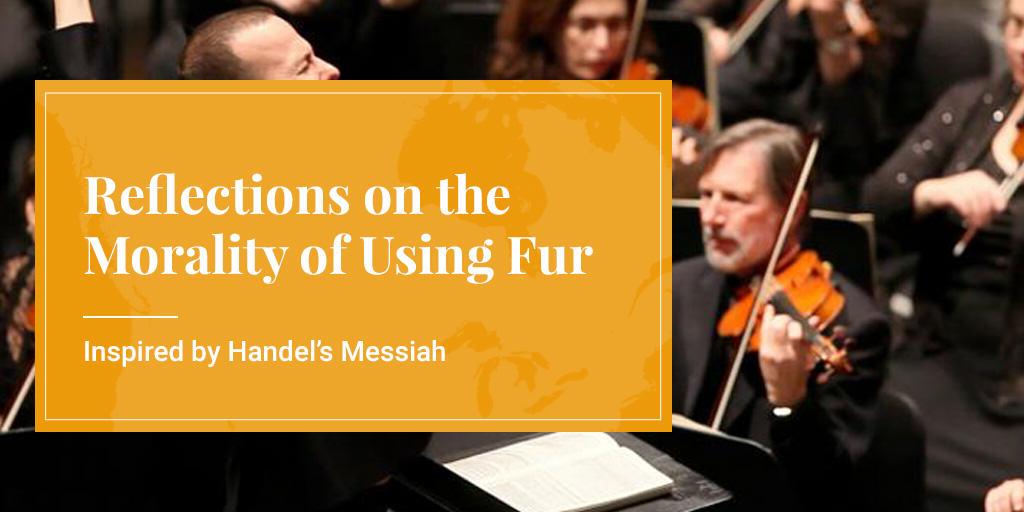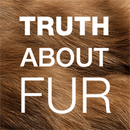
Animal-rights activists argue that we are not morally justified to kill animals for any purpose, and certainly not for products they consider to be non-essential, such as fur. But this view of morality may say more about the activists’ understanding of society, of nature and of their own unique place within the big scheme of things than it does about people who produce or wear fur.
This thought came to me just before Christmas during a moving performance of Handel’s Messiah, by Montreal’s Metropolitan Orchestra and Choir with star conductor Yannick Nézet-Séguin. Handel’s magnificent oratorio was premiered in Dublin, in 1742, under the direction of the composer; the beautiful libretto by Charles Jennens (1700-1773) is drawn from Old and New Testament texts.
“All we like sheep have gone astray;
We have turned every one to his own way.”
– Isaiah 53:6 (from libretto of Handel’s Messiah)
The music is transcendental, but my thoughts returned to more earthly matters as the choir sang the verse: “… we have turned every one to his own way.” Nine words that neatly sum up the guiding philosophy of modern Western society.
Don’t get me wrong: I am not romanticizing the time when the individual was required – often ruthlessly – to conform to the demands of family, clan, nation or religion. But the fact is that we, in our privileged Western societies, have ventured into uncharted waters: for the first time in human history, individual freedom and personal fulfilment are widely considered to be the most important goals, the ultimate “good”.
We no longer accept that our marriage partners be chosen by our families, or that what we eat and how we behave be dictated by tradition or a parish priest. Today, each of us claims the right to make our own decisions. The individual is king.
What does this have to do with the radical shift in thinking proposed by animal-rights philosophers? Maybe a lot. Because, above all, believers in animal rights assert that the rights of each animal must be recognised as inviolable. It is the individual animal, not the population or species that is important, according to this view. And this has far-reaching implications. Let’s see how.
Livestock and Humans Depend on Each Other
Most of us believe that humans have a right to use animals for food and other purposes, so long as animal populations are not diminished and species are not endangered. This is known as “sustainable use”. In other words, we eat chickens, but we don’t eat them all. Individual chickens are killed and eaten by individual humans – who will, in turn, one day themselves be eaten by worms, bacteria and other organisms – but both chickens and humans continue. In fact, with North Americans annually consuming some three billion chickens, and billions more eggs, one could argue that both chickens and humans are now very dependent on each other for survival.
A concern for animal welfare complements and deepens our sustainable-use values by acknowledging the individuals involved in this species-level symbiosis. The fact that individual animals die to provide for our needs implies, we believe, a responsibility to protect these animals from unnecessary suffering. In this sense, “animal welfare” seeks to balance the interests of groups and individuals.

The animal-rights philosophy, however, makes a quantum leap: the interests of individual animals are suddenly all that matter. According to animal-rights theorists, the individual chicken’s will-to-life is morally non-negotiable and irrevocable, no matter how useful their proteins may be for the health and well-being of humans – or, for that matter, for the survival of chickendom.
In other words, the animal-rights doctrine perfectly reflects our celebration of the individual in modern Western societies. And perhaps this explains, at least in part, why the animal-rights philosophy has considerable appeal in Western societies, especially among younger people.
Of course, our glorification of the individual is far from universal. Even today, most people live in societies where the individual has less autonomy, where their dependence on the group is more explicit. The moral force or “truth” of animal-rights arguments probably seem less evident in such societies.
And isn’t the dependence of the individual on the group a fundamental reality in all human societies? We live in cities, speak languages, use technologies, and have our spirits lifted by music that were all created by others, often people who are no longer with us.
Rights Not Rooted in Nature
A more profound challenge to the “truth” of the animal-rights philosophy comes from the fact that nature doesn’t show much consideration for individuals. In nature, individuals are short-lived and expendable; it is populations and species that continue.
This ecological truth does not diminish the importance of respecting human rights, but it reminds us that such rights are not rooted in nature or universal truth; they are created by human societies.
What is rooted in nature, however, is the dependence of all animals on other species – especially for food. Like it or not, only the living cells of other organisms can provide us with sustenance. No philosopher or activist can change this fundamental fact of our existence.
Nature is not moral or immoral, it just is. But humans do develop codes of morality, precisely because we live in groups and need each other. Without moral codes we would indeed be lost sheep. But if the animal-rights insistence on each animal’s irrevocable right-to-life is not defensible, what moral code regulates our use of animals?
Our Morality Towards Animals
When it comes to our relationship with animals, our moral code includes four main precepts. Two have already been mentioned: we should use only part of the surpluses that nature provides (“sustainability”), and we should protect the animals we use from unnecessary suffering (“animal welfare”). The other two moral precepts governing our relationship with animals are that we should not use animals for frivolous purposes (“important use”), and we should use as much of the animal as possible (“no waste”).
SEE ALSO: Why fur is the ethical clothing choice.
As I have explained in a previous article, the modern fur trade does respect all four of these important moral precepts. The use of fur, when it is responsibly and sustainably produced as it is today, is indeed morally justifiable, because it balances the needs of species and individuals in a way that is consistent with the way our world really works.
It is animal activists who are lost, who “have turned every one to his own way”, because their fundamentalist philosophy considers only the individual. In fact, as the great humanitarian and animal lover Albert Schweitzer once wrote: insisting that we harm no other life is not a solution to the moral problem that living beings kill and eat each other to survive – it is pretending that there is no problem.











Also “consistent with how the real world works”? Again, domestication and farming animals in captivity doesn’t occur in nature and it’s not done for survival, you’re writing this on a computer in the shelter of a house so you’re not in a situation where you require violently skinning/gassing an animal for their fur. I realize this will do nothing though, this is PR for the fur industry, you’re just saying what it takes to defend your business.
You’re far too cynical. Has it occurred to you that many people who do PR for animal-use industries actually believe what they’re saying? And don’t focus too closely on fur. What we do is no different from what PR folks do for dairy, eggs, fish … you name it.
This whole page perpetuates the outdated myth that we require animal products to survive, which we don’t in this century. Animal farming is nothing but a business for entertainment, money, and pleasure. But I can understand, it’s totally natural and for survival to confine and domesticate animals to be easy to kill in massive numbers after all, we just can’t live without it. Oh wait, millions of people have, including vegetarians for centuries. It’s pretty sick of you to claim that an individual doesn’t have moral value but then again that’s the whole basis of this group. Only fools will claim that domestication and confining animals in industrial settings, and justifying killing them for an outdated product cause you let them live for sometime is somehow the same as animals dying of disease and predation in the wild.
well written Allen.
Well done! The lunacy and logical fallacy of the animal ‘rights’ movement never ceases to amaze and disgust me.
So very very well said